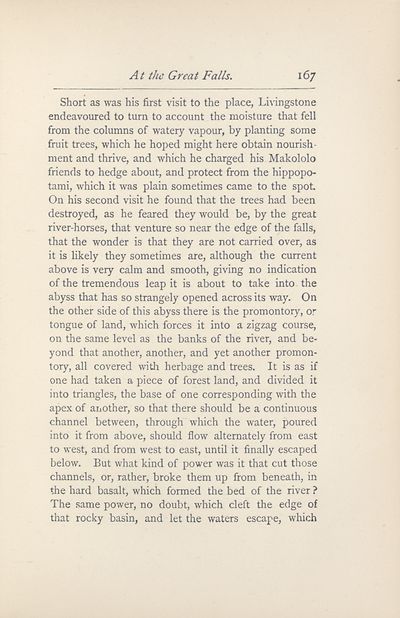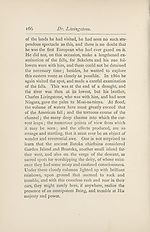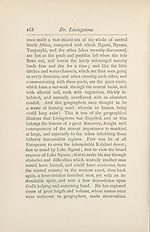Religion & morality > David Livingstone
(195)
Download files
Complete book:
Individual page:
Thumbnail gallery: Grid view | List view

A t the Great Falls.
167
Short as was his first visit to the place, Livingstone
endeavoured to turn to account the moisture that fell
from the columns of watery vapour, by planting some
fruit trees, which he hoped might here obtain nourish¬
ment and thrive, and which he charged his Makololo
friends to hedge about, and protect from the hippopo¬
tami, which it was plain sometimes came to the spot.
On his second visit he found that the trees had been
destroyed, as he feared they would be, by the great
river-horses, that venture so near the edge of the falls,
that the wonder is that they are not carried over, as
it is likely they sometimes are, although the current
above is very calm and smooth, giving no indication
of the tremendous leap it is about to take into the
abyss that has so strangely opened across its way. On
the other side of this abyss there is the promontory, or
tongue of land, which forces it into a zigzag course,
on the same level as the banks of the river, and be¬
yond that another, another, and yet another promon¬
tory, all covered with herbage and trees. It is as if
one had taken a piece of forest land, and divided it
into triangles, the base of one corresponding with the
apex of another, so that there should be a continuous
channel between, through which the water, poured
into it from above, should flow alternately from east
to west, and from west to east, until it finally escaped
below. But what kind of power was it that cut those
channels, or, rather, broke them up from beneath, in
the hard basalt, which formed the bed of the river ?
The same power, no doubt, which cleft the edge of
that rocky basin, and let the waters escape, which
167
Short as was his first visit to the place, Livingstone
endeavoured to turn to account the moisture that fell
from the columns of watery vapour, by planting some
fruit trees, which he hoped might here obtain nourish¬
ment and thrive, and which he charged his Makololo
friends to hedge about, and protect from the hippopo¬
tami, which it was plain sometimes came to the spot.
On his second visit he found that the trees had been
destroyed, as he feared they would be, by the great
river-horses, that venture so near the edge of the falls,
that the wonder is that they are not carried over, as
it is likely they sometimes are, although the current
above is very calm and smooth, giving no indication
of the tremendous leap it is about to take into the
abyss that has so strangely opened across its way. On
the other side of this abyss there is the promontory, or
tongue of land, which forces it into a zigzag course,
on the same level as the banks of the river, and be¬
yond that another, another, and yet another promon¬
tory, all covered with herbage and trees. It is as if
one had taken a piece of forest land, and divided it
into triangles, the base of one corresponding with the
apex of another, so that there should be a continuous
channel between, through which the water, poured
into it from above, should flow alternately from east
to west, and from west to east, until it finally escaped
below. But what kind of power was it that cut those
channels, or, rather, broke them up from beneath, in
the hard basalt, which formed the bed of the river ?
The same power, no doubt, which cleft the edge of
that rocky basin, and let the waters escape, which
Set display mode to:
![]() Universal Viewer |
Universal Viewer | ![]() Mirador |
Large image | Transcription
Mirador |
Large image | Transcription
| Antiquarian books of Scotland > Religion & morality > David Livingstone > (195) |
|---|
| Permanent URL | https://digital.nls.uk/110312441 |
|---|
| Description | Thousands of printed books from the Antiquarian Books of Scotland collection which dates from 1641 to the 1980s. The collection consists of 14,800 books which were published in Scotland or have a Scottish connection, e.g. through the author, printer or owner. Subjects covered include sport, education, diseases, adventure, occupations, Jacobites, politics and religion. Among the 29 languages represented are English, Gaelic, Italian, French, Russian and Swedish. |
|---|

